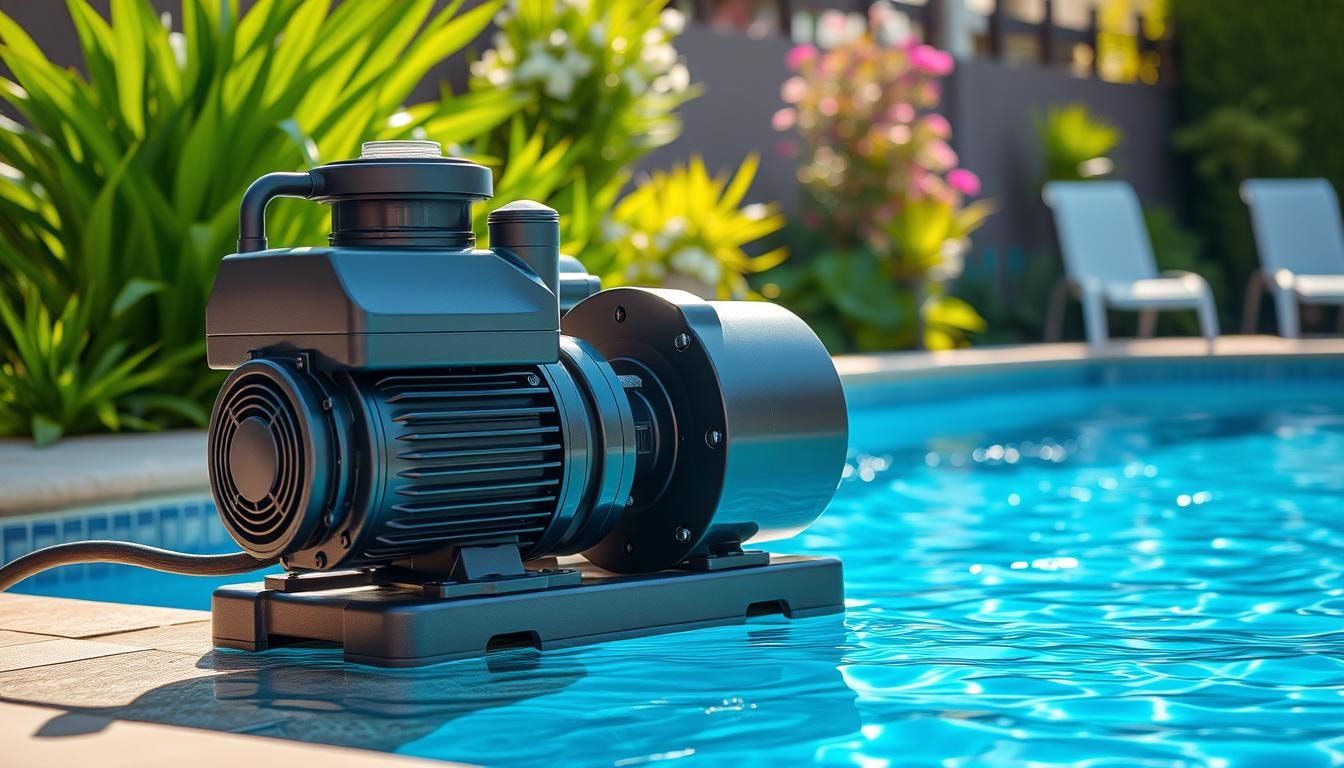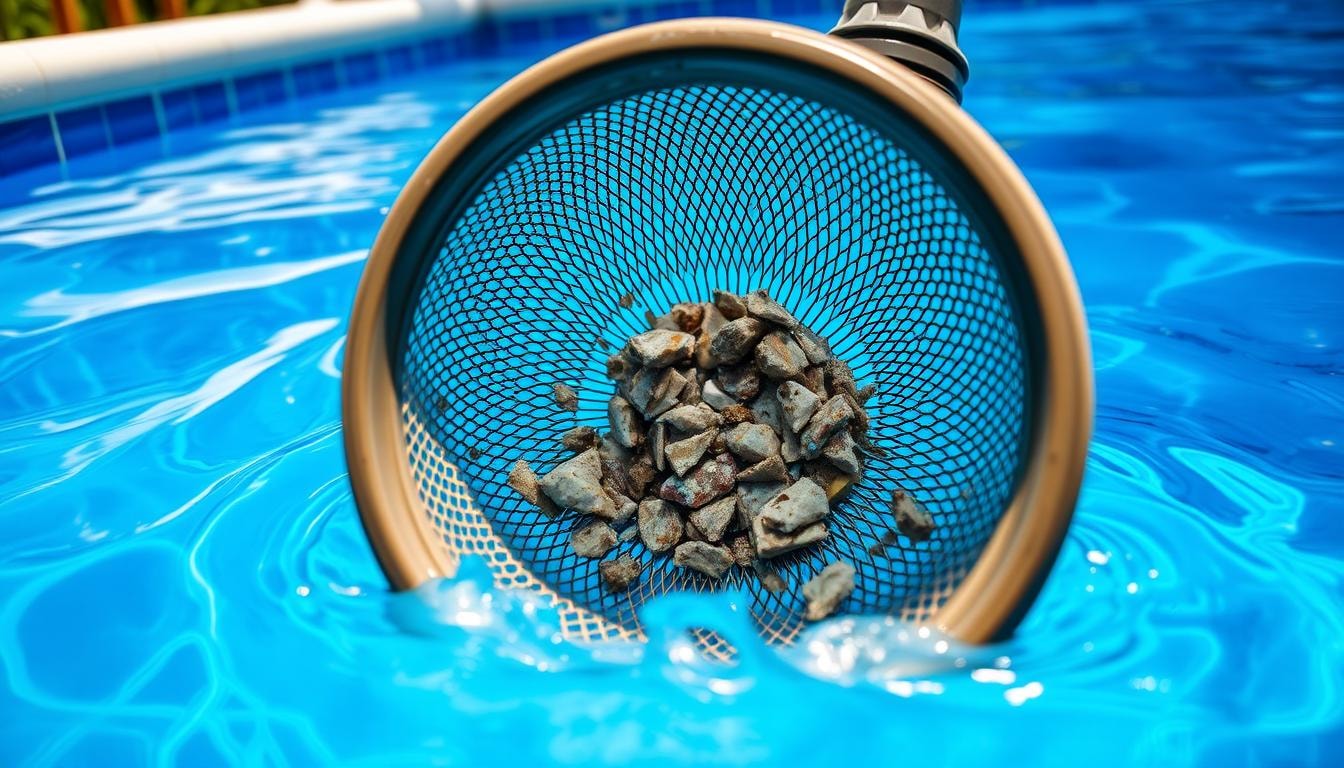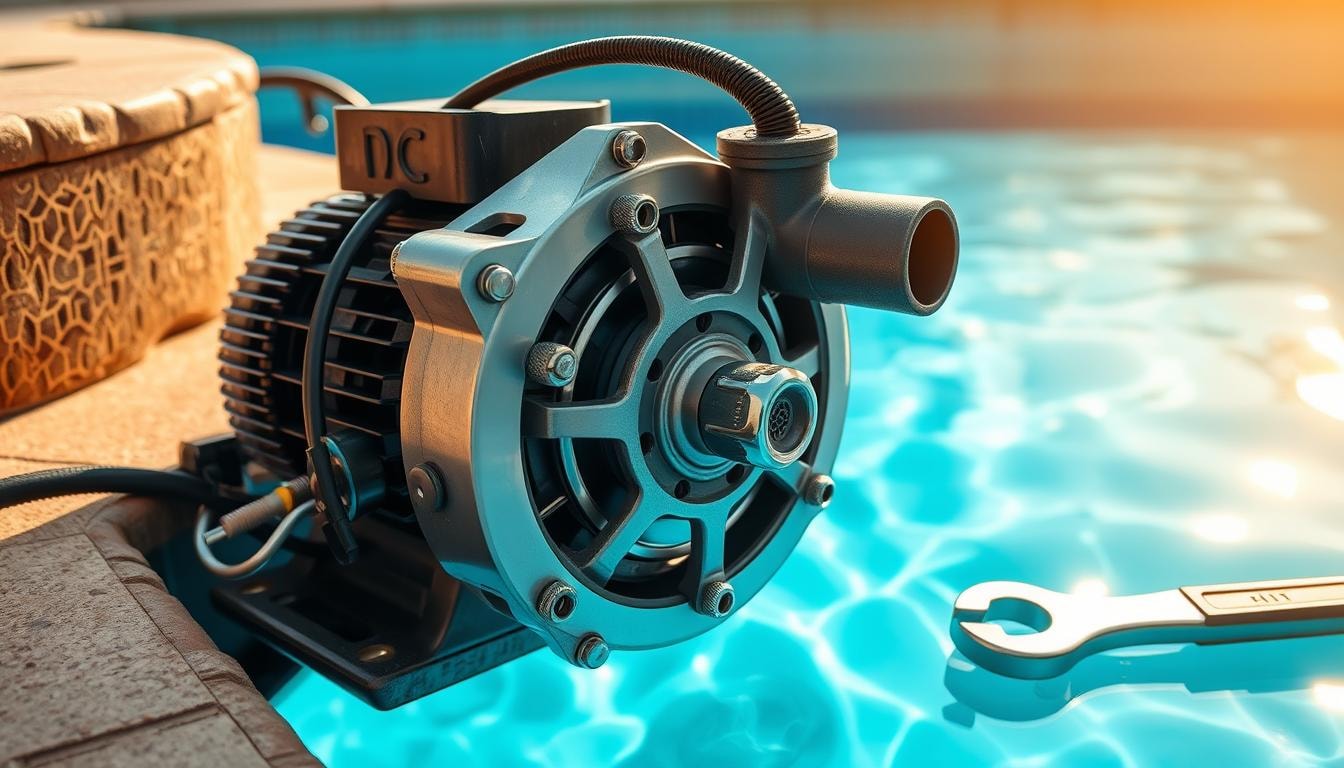Pool Pump Repair Near You
Can’t find what you are looking for?
How It Works
-
Answer a few questions about your home project.
-
Within seconds, get matched with top-rated local pros.
-
Compare quotes and choose the best pro for the job.
Pool Pump Repair In Your Area
Pool Pump Repair: A Step-by-Step Guide
Meta Description: Learn how to troubleshoot and repair your pool pump with our comprehensive guide. Save money and time by fixing common issues yourself or knowing when to call a pro.

Is your pool pump acting up? You’re not alone. Pool pumps often face challenges, but there’s hope. With know-how and effort, you can fix your pump.
This guide will help you diagnose and repair common pool pump issues. You’ll learn how to keep your filtration system running smoothly all season long.
Key Takeaways
- Pool pumps are vital for filtration, creating suction and pressure to move water through the system.
- Regular maintenance and troubleshooting can extend your pool pump’s life and prevent costly breakdowns.
- You can often fix common issues like clogged impellers with basic tools and DIY skills.
- Knowing when to call a professional can save you time and money.
- Seasonal maintenance improves energy efficiency and extends equipment life.
What is a Pool Pump and Why is it Important?
A pool pump is crucial for any pool system. It circulates water through filters, keeping the pool clean and healthy. Think of it as the pool’s heart, moving water in and out.
Understanding the Role of a Pool Pump
Pool pumps are vital for maintaining water quality. They push water through filters to remove dirt and debris. The pump also helps spread chemicals evenly, keeping the water balanced and clean.
Without a working pump, pool water becomes stagnant. This can lead to algae growth and harmful bacteria buildup.
Components of a Pool Pump
The motor powers the pump, driving its operation. The impeller draws water in and pushes it through filters. A pump basket catches large debris before it enters the pump.
The housing encases all parts and provides support. These components work together for smooth, efficient water circulation.
Preparing for Pool Pump Maintenance
Safety and proper tools are key for pool pump maintenance. Create a safe work area with the right equipment. This sets you up for success in maintaining your pool’s pump system.
Safety Precautions
Safety comes first when working on your pool pump. Turn off the power to avoid electrical shock. Wear protective gloves and safety glasses to guard against chemicals and debris.
Necessary Tools and Materials
Get these tools ready for efficient pool pump maintenance:
- Screwdrivers (flathead and Phillips head)
- Pliers or wrench set
- Lubricants (silicone-based or lithium-based)
- Replacement parts (if needed, such as o-rings, gaskets, or bearings)
- Cleaning supplies (including a pool vacuum, brushes, and pool filter cleaner)
With safety measures and the right tools, you’re ready for pool pump tasks. You can inspect the pump basket or replace worn-out parts with confidence.
Cleaning the Pump Basket

A clean pool pump basket keeps your pool system working well. Clogged baskets can limit water flow and damage equipment. Follow these steps to clean your pump basket properly.
Start by turning off the pool pump’s power for safety. Find the pump basket in the pump’s housing. Unscrew the lid to access the basket.
- Carefully remove the pump basket from the housing.
- Inspect the basket for any debris or buildup. This could include leaves, twigs, or other organic matter.
- Rinse the basket thoroughly with a garden hose, ensuring it is free of any trapped particles.
After cleaning, put the basket back and secure the lid. Restart the pump and check for proper water flow. If you notice issues, inspect the pump for other problems.
Regular cleaning helps maintain your pool system’s health. It can extend your pump’s life and prevent costly repairs later on.
Inspecting and Cleaning the Impeller
The pool pump’s impeller draws water into the system. It pushes water through the filtration process. Over time, debris can clog the impeller, causing performance issues.
Regular impeller maintenance keeps your pool pump efficient. It’s crucial to inspect and clean it often.
Signs of a Clogged or Dirty Impeller
Look out for these signs of a clogged impeller:
- Reduced water flow or pressure
- Unusual noises or vibrations coming from the pump
- Difficulty priming the pump
- Overheating of the motor
Steps to Clean the Impeller
Follow these steps to clean the impeller:
- Turn off the power to the pool pump and ensure it is unplugged.
- Remove the pump housing to access the impeller.
- Inspect the impeller for any debris or buildup, and use a soft-bristle brush or cloth to gently clean the impeller blades.
- Rinse the impeller and housing with clean water to remove any remaining debris.
- Reassemble the pump housing and restart the system.
- Check for any leaks or issues and make adjustments as necessary.
Regular impeller cleaning keeps your pool pump running smoothly. It also extends its lifespan. For persistent issues, consult a professional pool technician.
Replacing O-Rings
O-rings are vital for your pool pump’s efficiency. These circular seals create a watertight barrier, preventing leaks. They ensure optimal performance of your pool system.
Over time, O-rings can wear out, crack, or lose shape. This can compromise your pool system’s integrity. Regular replacement is essential for maintenance.
Importance of O-Rings
Functional O-rings are crucial for your pool pump’s operation. They seal the pump housing, preventing water escape. This maintains water flow and protects the motor.
Replacing worn O-rings is a simple task. It extends your pool equipment’s lifespan. It also keeps your system running efficiently.
Steps to Replace O-Rings
- Turn off the power to your pool pump and ensure that the system is completely shut down.
- Locate the areas where the O-rings are installed, such as the pump housing, valve, or motor shaft.
- Carefully remove the old O-rings, inspecting them for signs of wear or damage.
- Apply a small amount of silicone-based lubricant to the new O-rings before installing them.
- Reassemble the pump components, ensuring that the O-rings are properly seated and the connections are secure.
- Turn the power back on and check for any leaks or issues with the pump’s operation.
Regular O-ring inspection is key to pool pump maintenance. Timely replacement ensures your entire pool system’s long-term health. Don’t overlook this simple yet crucial task.
Inspecting the Motor

The pool pump motor drives your pool’s circulation system. Regular checks help spot issues early. This proactive approach extends equipment life and prevents costly repairs.
Start by turning off the pump’s power. Look for signs of overheating like discoloration or burning smells. Listen for unusual noises that might signal internal problems.
Check that electrical connections are secure and corrosion-free. Ensure the motor has good airflow to prevent overheating. Clear away any debris blocking air circulation.
- Check for signs of overheating, such as discoloration or a burning smell.
- Listen for unusual noises that could indicate a problem with the motor.
- Verify that all electrical connections are secure and free of corrosion.
- Ensure the motor has proper ventilation to prevent overheating.
If you spot any issues, consult a professional pool pump repair specialist. They can diagnose and fix problems with your pool pump motor. This ensures your pool system keeps running smoothly.
Monthly Maintenance Tasks
Keeping your pool pump healthy is vital for a clean, inviting pool. A key monthly task is checking for leaks around the pump housing and plumbing connections.
Checking for Leaks
Turn off the pump before inspecting. Look for drips, moisture, or puddles around the pump housing and surrounding area. Tighten loose connections and replace faulty seals or O-rings to stop leaks.
Regular inspections prevent major issues like overheating and reduced performance. They also help avoid unusual noises. Maintaining your pool pump can extend its life and prevent costly repairs.
Preventative maintenance is crucial for the pump’s functionality. Checking for leaks and tightening connections keep your pool system running smoothly. These monthly tasks ensure efficiency for years to come.
Troubleshooting Common Pool Pump Issues
Pool pumps can face various problems that need careful fixing. Common issues include electrical problems, loss of prime, and reduced water flow.
Electrical Problems
Check the circuit breaker if your pool pump lacks power. Look for loose or damaged parts in electrical connections and wiring. A faulty pump capacitor can cause electrical issues too.
Replace the capacitor if needed. Regular checks can prevent many electrical problems from occurring.
Loss of Prime
Loss of prime happens when the pump can’t draw water. This can be due to air leaks or blockages. Check the pump basket for debris that may block water flow.
Keep the pool’s water level right. This stops air from being pulled into the system.
Reduced Water Flow
A clogged or dirty impeller often causes reduced water flow. Remove and clean the impeller to get rid of any debris. Check the pump basket and filter for blockages too.
If the problem continues, your pump might be too small. You may need to replace it with a larger one.
Fix these issues quickly to keep your pool system running well. Regular upkeep can help you avoid costly repairs later on.
Hiring Professionals for Pool Pump Repair
Some pool pump issues need expert help. Complex repairs, electrical problems, or motor issues require a trained technician. Professionals can handle deep cleaning and tricky problems.
Expert repairs can extend your pump’s life. They also help maintain great water quality. Hiring a pro ensures your pump works at its best.
Professional pool equipment repair offers many benefits. Let’s explore some key advantages:
- Expertise in diagnosing and repairing complex pool pump issues
- Proper handling of electrical components and safety protocols
- Ability to identify and address the root cause of problems
- Ensuring the pool system is functioning at optimal efficiency
- Extending the lifespan of your pool equipment
Professional pool pump repair gives you peace of mind. You’ll know your pool system is in good hands. Any issues will be fixed right the first time.
FindPros: Your Pool Pump Repair Solution
Is your pool pump acting up? Don’t worry, FindPros has you covered. Our network of top-rated local professionals can help you diagnose and fix common issues like clogged impellers, worn motor bearings, and leaking seals. Simply answer a few questions about your pool pump problem, and we’ll match you with the best-fitting pros in your area. Compare their quotes, read reviews, and choose the perfect technician for the job – all without the hassle of hunting down multiple service providers. With FindPros, you’ll get the right repairs at the best prices, so your pool pump can run smoothly and efficiently, season after season.
Conclusion
A well-functioning pool pump keeps your pool clean and enjoyable. Follow our guide for efficient pump operation. Regular care extends your pump’s life and maintains optimal water quality.
Call a pro for complex issues or major repairs. Proper maintenance ensures a clean, inviting pool for years. Your pool system is vital for a rewarding outdoor experience.
This guide helps you tackle various pump problems. Understanding your pool pump’s components is crucial. Following best practices for maintenance can prevent costly repairs or replacement.
Frequently Asked Questions (Pool Pump Repair)
MOST POPULAR CITIES
Browse by State- Alameda
- Costa Mesa
- Laguna Beach
- Orange
- Alhambra
- Culver City
- Lancaster
- Oroville
- Anaheim
- Daly City
- Livermore
- Oxnard
- Antioch
- Davis
- Lodi
- Pacific Grove
- Arcadia
- Downey
- Lompoc
- Palm Springs
- Bakersfield
- El Centro
- Long Beach
- Palmdale
- Barstow
- El Cerrito
- Los Angeles
- Palo Alto
- Belmont
- El Monte
- Malibu
- Pasadena
- Berkeley
- Escondido
- Martinez
- Petaluma
- Beverly Hills
- Eureka
- Marysville
- Pomona
- Brea
- Fairfield
- Menlo Park
- Port Hueneme
- Buena Park
- Fontana
- Merced
- Rancho Cucamonga
- Burbank
- Fremont
- Modesto
- Red Bluff
- Calexico
- Fresno
- Monterey
- Redding
- Calistoga
- Fullerton
- Mountain View
- Redlands
- Carlsbad
- Garden Grove
- Napa
- Redondo Beach
- Carmel
- Glendale
- Needles
- Redwood City
- Chico
- Hayward
- Newport Beach
- Richmond
- Chula Vista
- Hollywood
- Norwalk
- Riverside
- Claremont
- Huntington Beach
- Novato
- Roseville
- Compton
- Indio
- Oakland
- Sacramento
- Concord
- Inglewood
- Oceanside
- Salinas
- Corona
- Irvine
- Ojai
- San Bernardino
- Coronado
- La Habra
- Ontario
- San Clemente